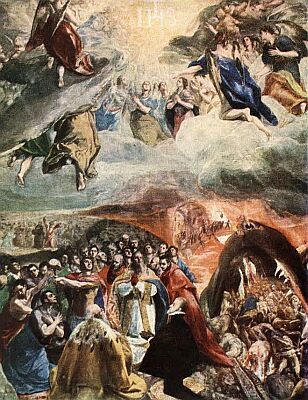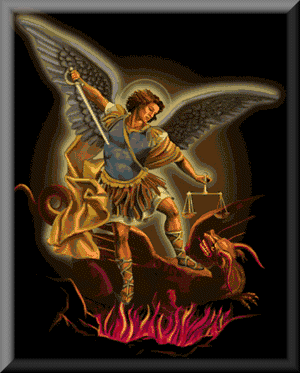From: Hebrews 6:10-20
The Danger of Apostasy and the Need for Perseverance (Continuation)
[10] For God is not so unjust as to overlook your work and the love which you
showed for his sake in serving the saints, as you still do. [11] And we desire
each one of you to show the same earnestness in realizing the full assurance
of hope until the end, [12] so that you may not be sluggish, but imitators of
those who through faith and patience inherit the promises.
The Promises Made to Abraham, Confirmed by Oath, Cannot Be Broken
[13] For when God made a promise to Abraham, since he had no one greater
by whom to swear, he swore by himself, [14] saying, “Surely I will bless you
and multiply you.” [15] And thus Abraham, having patiently endured, obtained
the promise. [16] Men indeed swear by a greater than themselves, and in all
their disputes an oath is final for confirmation. [17] So when God desired to
show more convincingly to the heirs of the promise the unchangeable character
of his purpose, he interposed with an oath, [18] so that through two unchangea-
ble things, in which it is impossible that God should prove false, we who have
fled for refuge might have strong encouragement to seize the hope set before us.
[19] We have this as a sure and steadfast anchor of the soul, a hope that enters
into the inner shrine behind the curtain, [20] where Jesus has gone as a forerun-
ner on our behalf, having become a high priest for ever after the order of Melchi-
zedek.
*********************************************************************************************
Commentary:
9-12. The letter now changes to a tone of encouragement. “After speaking harshly
about the position of the faithful, to prevent their falling into despair he now reveals
why he has written what he has: he wants to lead them well away from danger.
And so, in the first place, he tells them what confidence he has in them, and then
gives the reason why they should feel confident themselves—because God is not
unjust” (St Thomas Aquinas, “Commentary on Heb.”, 4,3).
The readers are called “beloved”; this was how St Paul normally addressed those
who embraced the faith through his preaching (cf. 1 Thess 2:8; 1 Cor 10:14; 15:
58; 2 Cor 7:1; 12:19; Rom 1:7; Phil 2:12; 4:1; etc.). The writer wants to see the
situation improve, perhaps to see the trials pass or become easier; certainly he
wants his readers to use their tribulation to help them to achieve salvation. He is
moved when he recalls the charity they have shown one another: theirs has been
an active fraternity, shown in deeds of service to the “saints”, which was the way
St Paul often referred to the brethren (cf. Rom 1:7; 1 Cor 1:2; 2 Cor 1:1; Eph 1:1;
Phil 1:1; Col 1:2; etc.); their charity is practised “for his sake”, for God. In their
present circumstances, in the persecution they are experiencing, God will not
abandon them (cf. Heb 10:33-34), for they have been generous in the almsgiving
and hospitality that is so proper to Christians (cf. Rom 15:25, 31; 1 Cor 16:15;
Eph 1:15; 2 Cor 8:4; 9:1, 12). “Now that we hear this—I beg you—let us serve the
saints!, for every member of the faithful is a saint by the mere fact of belonging
to the faithful [...]. Let us not be charitable only towards monks who live in the
mountains. It is true that their faith and their lives make them saints, but many
of those who live here are also saints: all are saints by virtue of their faith, and
many are saints by virtue of their lives too. So, if you see someone suffering, do
not doubt it for one moment: his very suffering gives him the right to be helped”
(St John Chrysostom, “Hom. on Heb.”, 10). It is not enough, however, to have
a history of doing good: it is necessary to persevere in doing good, as if to say:
By seeing through to the end what you have started you shall obtain everything
you hope for. They must do good right “to the end”, for he who endures to the
end will be saved (cf. Mt 10:22; 24:13; “Commentary on Heb.”, 4, 3). “Eternal life
should be set before those who persevere in good works ‘to the end’ (cf. Mt 10:
22) and who hope in God; it should be set before them as being the grace that
God, through Jesus Christ, has mercifully promised his sons and ‘as the reward
which, according to God’s personal undertaking, most assuredly will be given
them for their good works and merits (cf. St Augustine, “De Natura Et Gratia”,
VIII, 20)” (Council of Trent, “De Iustificatione”, Chap. 16).
However, there is always the danger of slowing down: lazy people often excuse
their inaction by pointing to the suffering and difficulties that doing good involves.
The strength of one’s resolutions is shown by the way one copes with difficulties:
“You will convince me that you sincerely want to achieve your goals when I see
you go forward unwaveringly. Do good [...]; practise the virtue of justice, right
where you are, in your normal surroundings, even if you end up exhausted. Fos-
ter happiness among those around you by cheerfully serving the people you work
with and by striving to carry out your job as perfectly as you can, showing under-
standing, smiling, having a Christian approach to life. And do everything for God,
thinking of his glory, with your sights set high and longing for the definitive home-
land, because there is no other goal worthwhile” (St. J. Escriva, “Friends of God”,
211).
13-15. Abraham is an example, for every generation, of faith that is full of hope
and patience; he is a man with great strength of character (cf. Rom 5:3-5). Al-
ready in the Epistle to the Romans Abraham is cited as an example of faith and
hope (cf. Rom 4:18-22). There St Paul highlights Abraham’s faith in the Lord’s
promise that he would have innumerable descendants in spite of the fact that he
was already an old man and unlikely to father children (cf. Gen 15:5; 17:1, 17).
The Apostle may also have been alluding to the episode (cf. Gen 22), when God
asked the patriarch to sacrifice Isaac, the son he had so yearned for: at that
point Abraham did indeed “believe against hope” (cf. Rom 4:18; Gen 22:15-17).
Here, on the other hand, of all the various promises made to Abraham of bles-
sings and numerous offspring (cf. Gen 12:2-3, 7; 13:14-17; 15:5-7; 13:16; 17:4-8,
19), what is explicitly mentioned is the promise made after God prevented him
from sacrificing his son. That was the first occasion the Lord “swore by himself”
to a man. This divine promise, supported by an oath and seen as the most so-
lemn “word of Yahweh”, was the foundation of Israel’s hope for thousands of
years. Abraham himself recalled it when he was dying (cf. Gen 24:7); it was the
support of Moses in all his great endeavors (cf. Ex 13:5,11; 32:13); David, too,
gave thanks to God for it(1 Chron 16:16; Ps 105:9); and at the dawn of the Re-
demption Zechariah rejoiced over it (Lk 1:73): it was “the oath which God swore
to our Father Abraham” and it was fulfilled in Christ and in the Church (cf. Gal
4:21-31).
Abraham “obtained the promise” in the sense that he was enabled to see with
his own eyes his promised son, Isaac, who was born to Sarah despite her old
age. Not alone that: the New Testament tells us (cf. Jn 8:56; Gal 3:8) that he
was given some sort of prophetic vision which allowed him to see the day of
Christ and rejoice at it.
16. Secular writers of antiquity used to define an oath as something attached to
a statement which cannot be proved, to provide a divine guarantee (cf. Pseudo-
Aristotle, “Speech to Alexander”). This meant that they regarded an oath as a
proof at law, to be put alongside the text of the law, the evidence of witnesses,
agreement between the parties, and a confession of guilt. The Jews regarded
an oath as something so awesome, so solemn, that they never dared swear an
oath by God directly; instead they would swear by angels or by the life of men,
such as the Messiah, Moses, Solomon, or by the gates of the temple, etc. (cf.
Mt 5:34-36; 23:16-22). Philo of Alexandria, an heir to Jewish tradition and Greco-
Roman thought, says that “by means of oaths, matters subject to doubt before
the courts are resolved; what was not clear is made clear; and what was regar-
ded as unreliable is rendered reliable” (”De Sacrificio Abel”, 91).
St Thomas Aquinas developed and combined these ideas by saying that “an
oath is an act of the virtue of religion which gives reliability to something previous-
ly in doubt. For in the sphere of knowledge nothing becomes certain unless it be
demonstrated from something which is more certainly known. When oaths are
taken, this certainty is obtained because the oath is sworn on God, who is the
greatest and surest there is, since for men nothing is truer than God” (”Commen-
tary on Heb, ad loc.”). The Thomist definition has become widely accepted be-
cause it also fits in with the commonly held view that swearing an oath is a way
of honoring the sacred name of God. When an oath is properly made — meeting
the necessary traditional requirements of truth justice and judgment — that is,
when it is made sincerely, for good reasons and not lightly, it is a morally good
and meritorious act because it does honor to God’s infinite truthfulness.
On Christ’s teachings concerning oath-taking see the notes on Mt 5:33-37 and
23:16-22.
17-18. “Through two unchangeable things”: in promises made by God his vera-
city is doubly committed—as the taker of the oath and as its guarantor.
God’s covenant with Abraham and his oath to give him descendants took place
at separate times (cf. Gen 15:7-18; 22:16-18). However, both episodes stem from
a single act of God’s will, in that he wanted to reward Abraham’s obedience and
at the same time commit himself by the use of external formalities proper to He-
brew legal practice. Among the Hebrews, when people made a pact, they sacri-
ficed animals; the victims were then quartered and the contracting parties walked
between the carcasses to symbolize that they would die the same death if they
failed to keep the pact. God passed between the pieces of the animals Abraham
sacrificed, in the form of a flaming torch, thereby giving him to understand that
he (God) was under a most solemn obligation to do what he promised. In the se-
cond episode this rite was not repeated, but he “interposed with an oath”, rene-
wing as it were the “passing between” rite that accompanied the covenant.
God chose to express his promise by following this human form of contract in
order to make his words more intelligible and to give us greater confidence.
19-20. God’s promise and oath are the gateway to our salvation, an anchor
which makes us feel safe no matter what hazards threaten us. The Christian,
who is, through faith, the true descendant of Abraham (cf. Rom 4:12) and the
heir of the promise (cf. Gal 3:14, 16, 29), is therefore certain that God will keep
his word. That is why the text says that we should “have strong encouragement
to seize the hope set before us” (v. 18). Hope is a kind of hold on what is pro-
mised, a kind of anchor that is “sure and steadfast”. “For just as the anchor
thrown overboard prevents the ship from moving, even if it is being battered by
countless winds, but instead keeps it in one place, hope has the same effect”
(Chrysostom, “Hom. on Heb.”, 11). Greek and Roman authors often used the
simile of an anchor in connection with being steadfast in virtue and hopeful of
happier times. The anchor has always been a motif in Christian art expressive
of much more than a human sense of safety: it symbolizes the Christian’s faith,
his certainty in the resurrection of the Lord and in his own resurrection; it is a
symbol of a confidence which stems from his intimate union with Christ. The sa-
cred text brings together all those ideas: in a certain sense the anchor is Christ
himself who through his redemptive sacrifice gives us the conviction that we can
with him enter “into the inner shrine”, that is, the heavenly sanctuary. “I have
asked you to keep on lifting your eyes up to heaven as you go about your work,
because hope encourages us to grasp the strong hand which God never ceases
to reach out to us, to keep us from losing our supernatural point of view. Let us
persevere even when our passions rear up and attack us, attempting to imprison
us within the narrow confines of our selfishness; or when puerile vanity makes
us think we are the center of the universe. I am convinced that unless I look up-
ward, unless I have Jesus, I will never accomplish anything. And I know that the
strength to conquer myself and to win comes from repeating that cry, ‘I can do
all things in him who strengthens me’ (Phil 4:13), words which reflect God’s firm
promise not to abandon his children if they do not abandon him” (St. J. Escriva,
“Friends of God”, 213). “A man should be tied to hope in the same way as the
anchor is tied to the ship. But there is a difference between the anchor and hope:
the anchor reaches down to get its hold, whereas hope reaches upwards, laying
hold of God” (”Commentary on Heb., ad loc.”).
20. The sacrifice, resurrection and glorification of Christ are the grounds of our
hope. In the Old Testament, the high priest entered the Holy of Holies once a
year, on the Day of Atonement; this he did after offering one sacrifice in expiation
of his own sins and another for the sins of the entire people. By his sacrifice on
the cross, Christ entered into the true sanctuary of heaven and gave all men ac-
cess to it. The reason for our firm hope is the fact that Christ has entered heaven.
“It was not into the Holy of Holies (where Moses entered) but behind the curtain,
into heaven, that he, Christ Jesus, went as our forerunner and was made a priest
forever. He went not like Aaron, to offer the sacrificial victims, but to offer prayer
for all the nations, like Melchizedek” (St Ephraem, “Com. in Epist. ad Haebreos”,
6).
The description here of Christ as a “forerunner” has great depth and beauty. This
is the only time this word is used in the New Testament, although Christian tradi-
tion soon came to use it, on the basis of the prophecy of Malachi (Mal 3:1), to
describe St John the Baptist, the envoy sent in advance of Jesus to prepare his
way (cf. Mk 1:2; Lk 1:76). Here the perspective is slightly different: it has to do
not with preparing for the proclamation of the Gospel but with attaining final beati-
tude. Christ has gone before us into heaven to prepare a place for us (cf. Jn 14:2):
he is our hope (cf. Col 1:27; 1 Tim 1:1), our life (cf. Col 3:4), our way (cf. Jn 14:6),
whereby we have access to the Father (cf. Eph 2:18-2:7). Christ is a “forerunner”
in the literal sense of the word—one who “runs ahead”, who went on ahead of the
party to announce its arrival; or it can be understood in the sense of the first one
to reach the finish, the first to finish the race. For our Lord is the first-born among
the dead, the first in everything (cf. Col 1:18) the first fruits of those who will arise
(cf. 1 Cor 15:20). By his merits he has already obtained the prize that we hope
to win. Christian hope cannot falter, for it is based on the perennial value of the
sacrifice and priesthood of Christ. Thus, the last words of this chapter remind us
of the main theme of the epistle.
*********************************************************************************************
Source: “The Navarre Bible: Text and Commentaries”. Biblical text from the
Revised Standard Version and New Vulgate. Commentaries by members of
the Faculty of Theology, University of Navarre, Spain.
Published by Four Courts Press, Kill Lane, Blackrock, Co. Dublin, Ireland, and
by Scepter Publishers in the United States.
From: Mark 2:23-28
The Law of the Sabbath
[23] One Sabbath He (Jesus) was going through the grainfields; and as they
made their way His disciples began to pluck ears of grain. [24] And the Phari-
sees said to Him, “Look, why are they doing what is not lawful on the Sabbath?”
[25] And He said to them, “Have you never read what David did, when he was
in need and hungry, he and those who were with him: [26] how he entered the
house of God, when Abiathar was high priest, and ate the bread of the Presence,
which it is not lawful for any but the priests to eat, and also gave it to those who
were with him?” [27] And He said to them, “The Sabbath was made for man,
not man for the Sabbath; [28] so the Son of Man is Lord even of the Sabbath.”
*********************************************************************************************
Commentary:
24. Cf. note on Matthew 12:2. [Note on Matthew 12:2 states: “The Sabbath”:
this was the day the Jews set aside for worshipping God. God Himself, the ori-
ginator of the Sabbath (Genesis 2:3), ordered the Jewish people to avoid certain
kinds of work on this day (Exodus 20:8-11; 21:13; Deuteronomy 5:14) to leave
them free to give more time to God. As time went by, the rabbis complicated
this Divine precept: by Jesus’ time they had extended to 39 the list of kinds of
forbidden work.
The Pharisees accuse Jesus’ disciples of breaking the Sabbath. In the casuis-
try of the scribes and the Pharisees, plucking ears of corn was the same as har-
vesting, and crushing them was the same as milling—types of agricultural work
forbidden on the Sabbath.]
26-27. The bread of the Presence consisted of twelve loaves or cakes placed
each morning on the table in the sanctuary, as homage to the Lord from the
twelve tribes of Israel (cf. Leviticus 24:5-9). The loaves withdrawn to make room
for the fresh ones were reserved to the priests.
Abiathar’s action anticipates what Christ teaches here. Already in the Old Tes-
tament God had established a hierarchy in the precepts of the Law so that the
lesser ones yielded to the main ones.
This explains why a ceremonial precept (such as the one we are discussing)
should yield before a precept of the natural law. Similarly, the commandment
to keep the Sabbath does not come before the duty to seek basic subsistence.
Vatican II uses this passage of the Gospel to underline the value of the human
person over and above economic and social development: “The social order and
its development must constantly yield to the good of the person, since the order
of things must be subordinate to the order of persons and not the other way
around, as the Lord suggested when He said that the Sabbath was made for
man and not man for the Sabbath. The social order requires constant improve-
ment: it must be founded on truth, built on justice, and enlivened by love”
(”Gaudium Et Spes”, 26).
Finally in this passage Christ teaches God’s purpose in instituting the Sabbath:
God established it for man’s good, to help him rest and devote himself to Divine
worship in joy and peace. The Pharisees, through their interpretation of the Law,
had turned this day into a source of anguish and scruple due to all the various
prescriptions and prohibitions they introduced.
By proclaiming Himself ‘Lord of the Sabbath’, Jesus affirms His divinity and His
universal authority. Because He is Lord He has the power to establish other
laws, as Yahweh had in the Old Testament.
28. The Sabbath had been established not only for man’s rest but also to give
glory to God: that is the correct meaning of the expression “the Sabbath was
made for man.” Jesus has every right to say He is Lord of the Sabbath, be-
cause He is God. Christ restores to the weekly day of rest its full, religious
meaning: it is not just a matter of fulfilling a number of legal precepts or of con-
cern for physical well-being: the Sabbath belongs to God; it is one way, suited
to human nature, of rendering glory and honor to the Almighty. The Church,
from the time of the Apostles onwards, transferred the observance of this pre-
cept to the following day, Sunday—the Lord’s Day—in celebration of the resur-
rection of Christ.
“Son of Man”: the origin of the messianic meaning of this expression is to be
found particularly in the prophecy of Daniel 7:13ff, where Daniel, in a prophetic
vision, contemplates ‘one like the Son of Man’ coming down on the clouds of
Heaven, who even goes right up to God’s throne and is given dominion and glo-
ry and royal power over all peoples and nations. This expression appears 69
times in the Synoptic Gospels; Jesus prefers it to other ways of describing the
Messiah — such as Son of David, Messiah, et cetera — thereby avoiding the na-
tionalistic overtones those expressions had in Jewish minds at the time (cf. “In-
troduction to the Gospel according to St. Mark”, p. 62 above).
*********************************************************************************************
Source: “The Navarre Bible: Text and Commentaries”. Biblical text from the
Revised Standard Version and New Vulgate. Commentaries by members of
the Faculty of Theology, University of Navarre, Spain.
Published by Four Courts Press, Kill Lane, Blackrock, Co. Dublin, Ireland, and
by Scepter Publishers in the United States.
Feast of
the Holy Name of Jesus

Luke 2:21 "...Et vocatum est Nomen eius IESUS"
("And His Name was called JESUS")
Psalm 90:14 "Because he hoped in me I will deliver him:
I will protect him because he hath known My Name."
Zacharias 10:12 "I will strengthen them in the Lord,
and they shall walk in His Name, saith the Lord."
Apocalypse 3:8 "I know thy works. Behold, I have given before thee a door opened, which no man can shut: because thou hast a little strength, and hast kept my word, and hast not denied My Name."
Apocalypse 15:4 "Who shall not fear Thee, O Lord, and magnify Thy Name?..."
Blessed be the most holy Name of Jesus without end!
January Devotion: The Holy Name of Jesus
The month of January is traditionally dedicated to the Holy Name of Jesus. This feast is also celebrated on January 3. Here is an explanation of the devotion.
Since the 16th century Catholic piety has associated entire months to special devotions. The devotion to the Holy Name of Jesus has been traditionally associated with the month of January, due to its celebration on January 3. The name Jesus was given to the Holy Child at God's command (Luke 1:31). The Holy Name is all-powerful because of the Person who bears it; we honor it because of the command of Christ, that we should pray in His Name and because it reminds us of all the blessings we receive through our Holy Redeemer. Hence St. Paul was able to write to the Philippians: ". . . at the name of Jesus every knee should bend of those in heaven, on earth, and under the earth" (Phil. 2:10). By means of this devotion we also make amends for improper use of the Holy Name.
Prayer Source: Prayer Book, The by Reverend John P. O'Connell, M.A., S.T.D. and Jex Martin, M.A., The Catholic Press, Inc., Chicago, Illinois, 1954
Prayer/Hymn in Honor of the Most Holy Name of Jesus - Iesu, Dulcis Memoria
Iesu, Dulcis Memoria is a celebrated 12th century hymn attributed to St. Bernard of Clairvaux (1090-1153), Doctor Mellifluus. The entire hymn has some 42 to 53 stanzas depending upon the manuscript. Parts of this hymn were used for the Feast of the Holy Name of Jesus, which was formerly celebrated on the Sunday between the Circumcision and Epiphany, or failing such a Sunday, on January 2. The part below was used at Vespers. In the liturgical revisions of Vatican II, the feast was deleted, though a votive Mass to the Holy Name of Jesus had been retained for devotional use. With the release of the revised Roman Missal in March 2002, the feast was restored as an optional memorial on January 3.
Jesus, the very thought of Thee
With sweetness fills the breast!
Yet sweeter far Thy face to see
And in Thy presence rest.
No voice can sing, no heart can frame,
Nor can the memory find,
A sweeter sound than Jesus' name,
The Savior of mankind.
O hope of every contrite heart!
0 joy of all the meek!
To those who fall, how kind Thou art!
How good to those who seek!
But what to those who find? Ah! this
Nor tongue nor pen can show
The love of Jesus, what it is,
None but His loved ones know.
Jesus! our only hope be Thou,
As Thou our prize shalt be;
In Thee be all our glory now,
And through eternity. Amen.
---Roman Breviary
Prayer Source: Prayer Book, The by Reverend John P. O'Connell, M.A., S.T.D. and Jex Martin, M.A., The Catholic Press, Inc., Chicago, Illinois, 1954
O Divine Jesus, Thou hast promised that anything we ask of the Eternal Father in Thy name shall be granted.
O Eternal Father. In the name of Jesus, for the love of Jesus, in fulfillment of this promise, and because Jesus has said it, grant us our petitions for the sake of Jesus, Thy Divine Son. Amen.
Prayer Source: Prayer Book, The by Reverend John P. O'Connell, M.A., S.T.D. and Jex Martin, M.A., The Catholic Press, Inc., Chicago, Illinois, 1954
That at the name of Jesus every knee should bend, of those that are in heaven, on earth, and under the earth, and every tongue confess that Jesus Christ is Lord, to the glory of God the Father.
Phil:2:10-11

Litany Of The Holy Name of Jesus
Feast of the Holy Name of Jesus
Jesus, The Name above all Names
Devotion to the Holy Name (of Jesus) [Catholic Caucus]
Lessons In Iconography : The Chi Rho - Christ
St. Francis de Sales on the Most Holy Name of Jesus (Excerpt from a Sermon) (Catholic Caucus)
St. Francis de Sales on the Most Holy Name of Jesus (Catholic/Orthodox Caucus)
St. Bernard on the Most Holy Name of Jesus [Ecumenical]
Saving the day in His Holy Name: St. Genevieve gets a reprieve [Catholic Caucus]
The Holy Name of Jesus
Holy Name of Jesus [San Bernadino of Siena] Ecumenical
The Holy Name of Jesus
Devotion to the Holy Name [of Jesus]
The Name of Jesus: Its Power in Our Lives
The Holy Name of Jesus
Devotion to the Holy Name of Jesus
The Holy Name of Jesus

 The following is the longer version of the vital prayer composed by Pope Leo XIII in 1888 after his startling vision as to the future of the Church. This prayer was dedicated for the Feast of St. Michael 1448 years from the date of the election of the first Leo - Pope Saint Leo the Great. Everyone is familiar with the first prayer below which was mandated by His Holiness as part of the Leonine Prayers after Low Mass. Below are both the short and longer versions of this poignant prayer which should never be forgotten.
The following is the longer version of the vital prayer composed by Pope Leo XIII in 1888 after his startling vision as to the future of the Church. This prayer was dedicated for the Feast of St. Michael 1448 years from the date of the election of the first Leo - Pope Saint Leo the Great. Everyone is familiar with the first prayer below which was mandated by His Holiness as part of the Leonine Prayers after Low Mass. Below are both the short and longer versions of this poignant prayer which should never be forgotten. 
 Look down upon me, O good and gentle Jesus, while before Thy face I humbly kneel, and with burning soul pray and beseech Thee to fix deep in my heart lively sentiments of faith, hope and charity, true contrition for my sins, and a firm purpose of amendment; the while I contemplate with great love and tender pity Thy five most precious wounds, pondering over them within me, calling to mind the words which David Thy prophet said of Thee, my good Jesus: "They have pierced My hands and My feet; they have numbered all My bones."
Look down upon me, O good and gentle Jesus, while before Thy face I humbly kneel, and with burning soul pray and beseech Thee to fix deep in my heart lively sentiments of faith, hope and charity, true contrition for my sins, and a firm purpose of amendment; the while I contemplate with great love and tender pity Thy five most precious wounds, pondering over them within me, calling to mind the words which David Thy prophet said of Thee, my good Jesus: "They have pierced My hands and My feet; they have numbered all My bones." 



